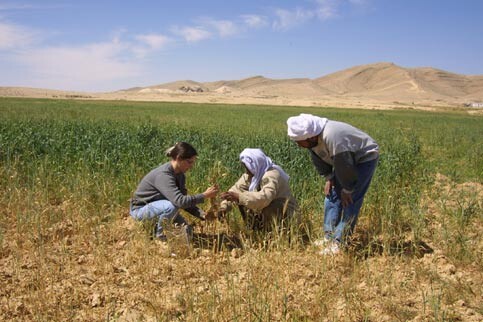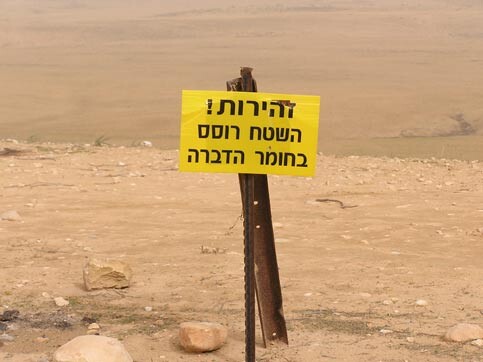Arab Association for Human Rights (HRA) 6 July 2004

On seven occasions, over a period of two years, the Israeli government has sent planes to the Negev to spray the crops of Bedouin farmers with toxic chemicals. Some 7,500 acres of Bedouin fields have been destroyed since February 2002. The last such incident occurred as recently as March 2004, at Qtamat and Abeida villages, ruining some 750 acres of crops shortly before the harvest.
Today, the Arab Association for Human Rights (HRA) publishes “By All Means Possible: Destruction by the State of Crops of Bedouin Citizens in the Naqab (Negev) by Aerial Spraying with Chemicals”, the first detailed report into the crop destruction, investigating both the legality of the government’s actions and the dangers posed to the local inhabitants’ health. The report also challenges the government’s arguments that it needs to use these drastic methods to evict the Bedouin farmers from lands it claims as state owned. The HRA argues instead that the government is in an unresolved legal dispute with the Bedouin over land ownership and that the state is trying to bypass proper legal channels by inflicting physical and financial damage on the Bedouin communities to force them to leave.
The report includes the opinions of two Israeli experts, a researcher in chemistry and biotechnology, Dr Awad Abu Freih, and a senior lecturer in environmental medicine and public health, Dr Elihu Richter. Both argue that the chemical used by the government, Roundup, is not suitable for aerial spraying - as stated on the herbicide’s packaging - because of the danger of drift in high winds. The toxic effects of the chemicals in Roundup, they say, are dangerous to humans and animals. The chemicals pose long-term threats to fertility and sperm reproduction, may cause genetic defects and may be carcinogenic. In the short term they can cause breathing problems, including congestion of the lungs, and irritation to the skin, eyes and throat, including blurred vision.
They may also provoke gastro-intestinal pain and vomiting, and cause destruction of red blood cells, which weakens the immune system. Ingestion of small quantities of Roundup can lead to death. Dr Richter concludes: “The application of any pesticide or herbicide by aerial spraying near human settlements is dangerous and should be banned.” He adds that Israel’s claims that it warns the Bedouin communities in advance, before the spraying, “does not provide a pretext for violating this rule since there is the potential for exposure to residues after spraying.”
In fact, the evidence collected by the HRA suggests that the government has been extremely negligent in all matters regarding the spraying operations.
First, it has ignored the usage instructions for Roundup which explicitly state that it not suitable for aerial spraying.
Second, despite the government’s claims, the HRA’s research suggests they have done nothing to warn the Bedouin farmers beforehand that their crops are about to be sprayed, through prior notice to community leaders or affected farmers.
Third, it is unclear as to whether the authorities have taken precautions about the weather conditions before they spray, in compliance with explicit warnings on Roundup’s packaging that it must not be used when there is a danger of drift. As a consequence, on several occasions toxins were blown over neighboring Bedouin communities. In one incident at al-Gharir village, on March 2003, the pilots appear to have ignored the presence of at least 11 Bedouin men and children in the fields that were being sprayed. As the spraying occurred in the run-up to the war with Iraq, several children and adults had panic attacks, thinking they had been targeted with biological weapons by Iraqi planes. The Bedouin arrived at a local hospital with breathing problems, dizziness, blurred vision and intestinal pains.

Fourth, according to the testimonies collected by the HRA and our own field research, the government has failed on every occasion but one to erect signs next to contaminated areas after spraying warning people to keep away. As it is several days before the crops wither and die, local Bedouin along with their sheep and goats have eaten contaminated produce. The al-Turi tribe say 150 goats died and 400 more lost their fetuses after a spraying operation. An Israeli journalist also reported becoming severely sick with stomach pains for three days after eating a cucumber following its spraying. Tests at a hospital in Beersheva showed high levels of toxins in his body.
The report also includes original findings by the author, a lawyer, that the authorities have been violating their own laws governing crop spraying. He reaches three shocking conclusions about the government’s violation of its own relevant legal code, the Flora Protection Law.
First, he finds that the department carrying out the spraying, the Israel Lands Administration (ILA), has no authority to conduct these kinds of operations: only the Ministry of Agriculture is authorized to take such action. The ILA is therefore grossly exceeding the terms of its legal powers.
Second, in law, the sole purpose of spraying crops is to eradicate pests and prevent their spread as a method of protecting public health. There is no provision for spraying as a method for evicting the farmers, even if they are perceived as trespassers. The law has therefore been applied improperly.
Third, the Flora Protection Law specifies the strict conditions in which spraying is permitted and that the Ministry of Agriculture’s flora protection division must authorize and oversee the spraying. No relevant statutory bodies have provided the information to confirm whether such precautions were taken, raising the suspicion that the legal procedures were not followed.
In fact, the government has provided almost no information about the spraying operations, in gross dereliction of its duty. A series of letters sent by Physicians for Human Rights to the main government ministries following the second spraying operation in March 2003 were either ignored or not answered properly. PHR wrote to the Health Ministry, the Environment Ministry, the District Veterinary Office and the ILA asking for detailed information about each department’s legal obligations in relation to the spraying operation. Only the Health Ministry and the Veterinary Office replied, both saying they had not been informed about the spraying by the ILA and their advice had not been sought.
As well as questioning the legality and the safety of the crop destruction operations, the report also investigates the background to these incidents and the reasons given for the aerial spraying by the government. The official explanation is that the government is trying to reclaim state-owned land from Bedouin farmers, a group it defines as illegal squatters. But, as the report reveals, the question of land ownership has not yet been settled in these cases. The Bedouin, who have farmed these lands since before the creation of the state of Israel, have both a historic claim to be the owners of the lands they farm and a subsidiary claim on the state providing at least some lands so that they may continue their traditional practices of farming and so maintain their way of life. Such farming is for most of these Bedouin their sole source of income. It should further be noted that the ILA appears not to know of the areas it sprayed which are state owned and which are still in dispute. The crop destruction was carried out in a blanket manner, without regard to the rights of the Bedouin inhabitants.
The comments of government ministers, however, suggest a very different context, and justification, for the crop destruction. These statements make it clear that the Bedouin are viewed not as Israeli citizens, with rights that derive from their citizenship, but as unwelcome invaders, trespassers who have no rights commensurate with the rights of Jewish citizens. Such a racist attitude was illustrated in a speech by Avigdor Lieberman, when he was Minister of National Infrastructure. He was reported in February 2002, after the first crop spraying, as saying: “We must stop their illegal invasion of state land by all means possible. The Bedouins have no regard for our laws; in the process we are losing the last resources of state lands. One of my main missions is to return to the power of the ILA in dealing with the non-Jewish threat to our lands.”
The language used should be noted: Lieberman’s references to “our laws” and “our lands” and “invasion” make a clear racist distinction between Bedouin and Jewish citizens. He is not alone. In February 2004 the deputy prime minister Ehud Olmert was reported in Haaretz as telling a convention of the Jewish National Fund that the state “will displace unrecognized Bedouin communities in order to make room for thousands of Jews”.
In fact the policy of crop destruction used against the Bedouin has precisely coincided with the government’s launch of a new plan to forcibly urbanize the Bedouin farmers by transferring them to newly created “townships”. This policy was begun in the 1970s but at least half the Bedouin population has refused to be concentrated into these towns (which have by far the worst record of poverty and social deprivation of any communities in Israel). The plan, backed with money to bolster police forces and law officials to enforce house demolitions and crop destruction against the Bedouin, is designed to complete the job begun three decades ago.
In the place of the Bedouin, more than a dozen Jewish communities and many more individual Jewish farms will be established. In a sign of the government’s own understanding that this plan violates international norms when dealing with indigenous peoples, Lieberman is also recorded as saying that the “best thing for the plan is silence.” The crop spraying should therefore be seen in the light of this cynical, and blatantly illegal, approach to the Bedouin farmers.
The HRA welcomes the issuing of a temporary injunction imposed by the Supreme Court on further spraying until a legal petition being presented by Adalah is heard on 20 October 2004. It will be submitting its report to the judges for their consideration and hopes that no further spraying will be allowed. But whatever the outcome of the case, HRA believes that those responsible for the spraying operations should be brought to trial and that the Bedouin farmers whose crops have been destroyed - thereby removing their sole source of income, money upon which thousands more family members rely - should be entitled by law to compensation.
Related links